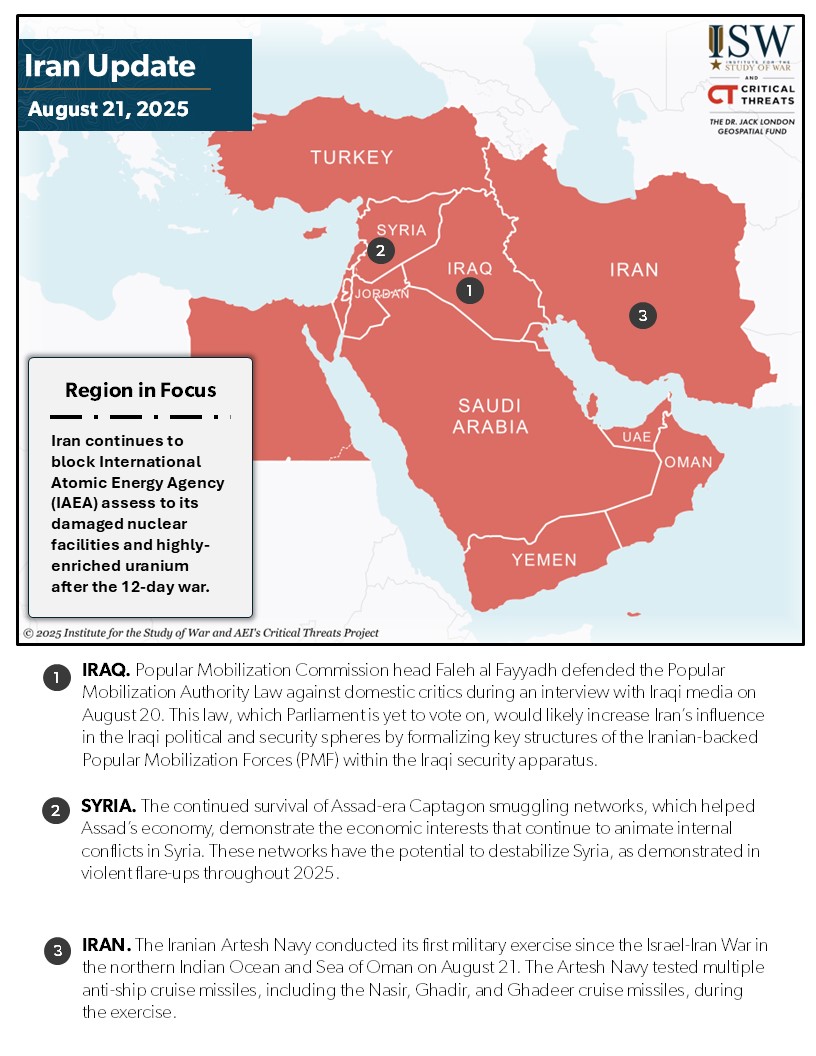Iraqi Popular Mobilization Committee (PMC) Chairman Faleh al Fayyadh defended the Popular Mobilization Authority Law against domestic critics during an interview with Iraqi media on August 20.[1] This law, which Parliament has yet to vote on, would likely increase Iran’s influence in the Iraqi political and security spheres by formalizing key structures of the Iranian-backed Popular Mobilization Forces (PMF) within the Iraqi security apparatus. The PMF is an Iraqi state security service comprised of many militias, some of which report to Islamic Revolutionary Guard Corps (IRGC) Quds Force Commander Esmail Ghaani instead of Iraqi Prime Minister Mohammad Shia al Sudani. Fayyadh denied Iranian-backed Iraqi militia involvement in the law’s creation and added that the law has been in development for years with Iraqi Ministry of Defense support. CTP-ISW is unable to verify Fayyadh’s claims about the militia's role in the law’s creation. The Council of Ministers, which is headed by Sudani and includes the Minister of Defense, approved the law and submitted it to Parliament in February 2025, which implies Ministry of Defense involvement, however. Fayyadh also claimed that the political debate over the Popular Mobilization Authority Law does not relate to the law’s “substance” but rather to his leadership. This law would elevate Fayyadh’s role as head of the PMC to a cabinet-level position within the newly-created Popular Mobilization Authority, which surely, in part, explains Fayyadh’s support for the law.
The continued survival of Assad-era Captagon smuggling networks, which helped Assad’s economy, demonstrates the economic interests that continue to animate internal conflict in Syria. These networks have the potential to destabilize Syria, as demonstrated in violent flare-ups throughout 2025. Captagon and other smuggling networks long helped sustain the Assad regime during the war. The regime profited 3 to 5 billion USD annually from the Captagon trade. Many of these networks continue to survive in Syria because, while Assad’s collapse destroyed the regime, it did not destroy many of the disparate networks that helped the regime survive for as long as it did. The transitional government began a counter-narcotics campaign in January 2024 that has naturally spurred a violent reaction from many of these networks. This campaign has reduced Captagon production by approximately 80%, according to the Financial Times on August 21.
The Iranian Artesh Navy conducted its first military exercise since the Israel-Iran War in the northern Indian Ocean and Sea of Oman on August 21. The Artesh Navy tested multiple anti-ship cruise missiles, including the Nasir, Ghadir, and Ghadeer, during the exercise. The ”Bavar-5,” which is an Iranian drone that can be launched from naval vessels, reportedly destroyed a target after traveling 400 kilometers. The naval exercise also included surface and subsurface vessels, aerial units, and electronic warfare units. | 




 [국방부] 국방부장관, 조셉 윤 주한미국대사대리 접견
[국방부] 국방부장관, 조셉 윤 주한미국대사대리 접견
 [ISW] 러시아 공세 캠페인 평가, 2025년 8월 21일
[ISW] 러시아 공세 캠페인 평가, 2025년 8월 21일


















